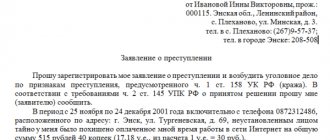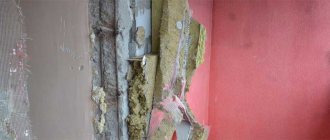Damage to someone else's property is the destruction or damage of someone else's private property to such an extent that it can no longer perform its functional duties. Someone else's private property means any thing that does not belong to the person who damaged or destroyed it.
Articles 167 and 168 of the Criminal Code of the Russian Federation on damage to someone else's property contain information about criminal liability for damage to someone else's property through negligence and intentional destruction of someone else's property.
Damage to property: definition and types
The legal dictionary means that damage is the loss of the original quality of objects under the influence of external factors. Property is a set of material assets that are in the possession of individuals/legal entities, municipal authorities or the state.
Classification of circumstances of damage to someone else's property:
- according to the degree of damage caused (complete destruction, partial damage);
- by degree of intent (intentional, unintentional);
- by subject of the offender (adults, teenagers, employed citizens);
- on the subject of the violation (damage to personal property of individuals, property of organizations, municipalities, states);
- depending on the applicable legal norm (Administrative Code, Criminal Code, Civil Code or Labor Code).
Attention! Punishment is applied to guilty persons only after proving the guilt of the offender and the extent of the damage caused.
Administrative responsibility
Article 7.17 of the Code of Administrative Offenses specifies a violation in the form of deliberate destruction or partial damage to material assets. The fact of liability is not affected by the type of property in relation to which illegal actions were committed. The main thing is confirmation of the amount of damage caused. A citizen will be held accountable only when the assessment of damage does not exceed insignificant amounts, namely 5,000 rubles .
The only type of penalty applied to violators in this case is a fine. Its size varies between 300-500 rubles.
The punishment is assigned by the judge considering the material. A protocol on violation is drawn up by the police and submitted to the magistrate’s court of the locality.
Attention! For causing damage to property, according to the Code of Administrative Offenses of the Russian Federation, citizens who have reached the age of 16 can be held accountable.
Article 115. Intentional infliction of minor harm to health
Article 115. Intentional infliction of minor harm to health
See comments to Article 115 of the Criminal Code of the Russian Federation
Information about changes:
Federal Law No. 420-FZ of December 7, 2011 amended Part 1 of Article 115
1. Intentional infliction of slight harm to health, causing short-term health disorder or minor permanent loss of general ability to work, -
shall be punishable by a fine in the amount of up to forty thousand rubles, or in the amount of the wages or other income of the convicted person for a period of up to three months, or by compulsory labor for a term of up to four hundred eighty hours, or by corrective labor for a term of up to one year, or by arrest for a term of up to four months.
Information about changes:
Federal Law No. 420-FZ of December 7, 2011 amended Part 2 of Article 115
2. The same act committed:
a) for hooligan reasons;
Information about changes:
Federal Law No. 227-FZ of July 21, 2014 amended paragraph “b” of Part 2 of Article 115
b) for reasons of political, ideological, racial, national or religious hatred or enmity, or for reasons of hatred or enmity towards any social group;
Information about changes:
Paragraph “c” was changed from August 6, 2021 - Federal Law of July 26, 2021 N 206-FZ
c) using weapons or objects used as weapons;
Information about changes:
d) in relation to a person or his relatives in connection with the performance of official activities by this person or the performance of public duty, -
shall be punishable by compulsory labor for a term of up to three hundred sixty hours, or correctional labor for a term of up to one year, or restriction of liberty for a term of up to two years, or forced labor for a term of up to two years, or arrest for a term of up to six months, or imprisonment for a term of up to two years.
| >Beatings |
| Contents Criminal Code (Criminal Code of the Russian Federation) |
© NPP GARANT-SERVICE LLC, 2021. The GARANT system has been produced since 1990. and its partners are members of the Russian Association of Legal Information GARANT.
Responsibility under criminal law
If the assessment of harm exceeds 5 thousand rubles, then articles of the Criminal Code are applied. After receiving the application, a pre-investigation check is carried out, and a decision is made based on its results. If there is a composition, the material is transferred for initiation, depending on the circumstances, into investigation or inquiry. After collecting a complete package of evidence, the criminal case is sent to court. The judge makes a decision taking into account the mitigating and aggravating circumstances of the case.
Intentional commission
Article 167 of the Criminal Code of the Russian Federation fixes the types of liability for intentional actions aimed at partial or complete destruction of property. To bring the perpetrator to justice, the following signs must be taken into account:
- Material damage. The amount of damage must exceed 5,000 rubles. The crime is considered completed only from the moment of occurrence of illegal consequences - assessment of damage.
- Intent. The guilty citizen must be aware of the illegality of his actions and the illegality of the consequences. During pre-trial investigative measures, the official will have to confirm that the person wanted the destruction or damage of property.
- Only persons who have reached the age of 16 can be subject to punishment (when applying Part 2 of this article - from the age of 14).
Art. 167 of the Criminal Code of the Russian Federation consists of two parts. The second part provides for a more severe penalty and is applied if property is damaged under the following circumstances:
- from hooligan motives;
- method of commission – arson, explosion or other method dangerous to society;
- unintentional death of a person;
- infliction of grave consequences by the act (moderate bodily injury to two or more victims, severe injury to one, destruction of housing, prolonged shutdown of enterprises or shutdown of heat supply, water, etc.).
| Intentional damage to property | ||
| Types of punishment | Part 1 Art. 167 | Part 2 Art. 167 |
| Fine | up to 40,000 rubles/3 months of income | – |
| Correctional work | up to a year | – |
| Mandatory work | up to 360 hours | – |
| Forced labor | up to 24 months | up to 5 years |
| Arrest | up to 90 days | – |
| Deprivation of liberty | up to 2 years | up to 5 years |
Damage to property due to negligence
Article 168 of the Criminal Code of the Russian Federation establishes sanctions for the same actions, but caused without direct intent. In particular, the following signs of a criminal act must be taken into account:
- the age of the offender must be over 16 years;
- material damage occurs due to careless handling of high-risk objects (fire, vehicles, electricity, technical equipment);
- lack of direct intent, that is, the offender committed the act knowing the danger of his actions, but hoped to avoid damage.
Depending on the identified circumstances of the case, the judge may impose one of the following types of punishment:
- penalties in a maximum amount of up to 120,000 rubles (salary for 12 months);
- compulsory work (no more than 480 hours);
- correctional labor (only up to 24 months);
- up to 1 year of forced labor/restriction or imprisonment.
The subject of the crime is state or municipal property
Vandalism, qualified by Article 214 of the Criminal Code of the Russian Federation, will be included in a special category of actions.
Vandalism in legal law is usually understood as:
- Intentional actions with the intent to cause harm. If the act was committed due to negligence, liability under Art. 214 of the Criminal Code cannot be applied.
- The subject, that is, the object to which the violation is directed, is buildings and structures, regardless of the form of ownership. This category also includes damage to state (state), municipal, and common property.
- Place of occurrence: public places or public transport.
- The peculiarity of the acts is desecration, disfigurement. That is, the object can continue to be used for its intended purpose, but the appearance of the structure (transport) is damaged.
- Only persons over the age of 14 can be punished.
Art. 214 of the Criminal Code of the Russian Federation consists of two parts. The first part provides punishment for a crime committed without aggravating features. The second part has qualifying characteristics for which more severe punishment is provided. These signs are:
- a group of persons takes part in the commission;
- The motive for the offense was racial and other social prejudices – discrimination.
| Damage to property due to vandalism | ||
| Types of punishment | Part 1 Art. 214 | Part 2 Art. 214 |
| Arrest | up to 3 months | – |
| Correctional work | up to 12 months | – |
| Mandatory work | up to 360 hours | – |
| Fine | up to 40,000 rubles/3 months of income | – |
| Deprivation of liberty | – | – |
| Forced labor | – | – |
| Restriction of freedom | – | up to 3 years |
Threat of property damage
There is no provision in current legislation that would provide for punishment for threatening to damage property. Therefore, it will not be possible to bring a citizen to legal liability only due to expressed threats.
Article 115. Intentional infliction of minor harm to health
Article 115. Intentional infliction of minor harm to health
See comments to Article 115 of the Criminal Code of the Russian Federation
Information about changes:
Federal Law No. 420-FZ of December 7, 2011 amended Part 1 of Article 115
1. Intentional infliction of slight harm to health, causing short-term health disorder or minor permanent loss of general ability to work, -
shall be punishable by a fine in the amount of up to forty thousand rubles, or in the amount of the wages or other income of the convicted person for a period of up to three months, or by compulsory labor for a term of up to four hundred eighty hours, or by corrective labor for a term of up to one year, or by arrest for a term of up to four months.
Information about changes:
Federal Law No. 420-FZ of December 7, 2011 amended Part 2 of Article 115
2. The same act committed:
a) for hooligan reasons;
Information about changes:
Federal Law No. 227-FZ of July 21, 2014 amended paragraph “b” of Part 2 of Article 115
b) for reasons of political, ideological, racial, national or religious hatred or enmity, or for reasons of hatred or enmity towards any social group;
Information about changes:
Paragraph “c” was changed from August 6, 2021 - Federal Law of July 26, 2021 N 206-FZ
c) using weapons or objects used as weapons;
Information about changes:
d) in relation to a person or his relatives in connection with the performance of official activities by this person or the performance of public duty, -
shall be punishable by compulsory labor for a term of up to three hundred sixty hours, or correctional labor for a term of up to one year, or restriction of liberty for a term of up to two years, or forced labor for a term of up to two years, or arrest for a term of up to six months, or imprisonment for a term of up to two years.
| >Beatings |
| Contents Criminal Code (Criminal Code of the Russian Federation) |
© NPP GARANT-SERVICE LLC, 2021. The GARANT system has been produced since 1990. and its partners are members of the Russian Association of Legal Information GARANT.
Civil regulation
Regardless of whether the actions of the guilty person contain signs of an administrative or criminal offense, the issue of claiming the amount of damage caused is additionally considered. Compensation for losses occurs through civil proceedings. In Art. 304 of the Civil Code of the Russian Federation states that the owner of property (individual, organization, municipality, state) has the right to compensation for damage in court.
Art. 1084 of the designated code fixes the need to pay monetary compensation to persons who suffered from illegal actions that resulted in harm to health. The procedure for claiming funds is described in the provisions of the Civil Procedure Code.
Labor legislation
Clause 6 art. 81 of the Labor Code of the Russian Federation stipulates the reasons for terminating working legal relations with a working citizen unilaterally at the initiative of the employer. One of these conditions is causing intentional damage to the organization’s property. Deliberate damage to property at an enterprise (or its complete destruction) can become grounds for dismissal only after the relevant court decision has entered into legal force.
Art. 238 of the Labor Code indicates which actions will be considered a labor misconduct, namely:
- deterioration of the condition of property on the company’s balance sheet;
- reduction in the number of corporate assets.
Disciplinary measures are applied as punishment. These include oral reprimands and those recorded in the worker’s personal file. The last resort, as noted above, is dismissal.
Article 115. Intentional infliction of minor harm to health
Article 115. Intentional infliction of minor harm to health
See comments to Article 115 of the Criminal Code of the Russian Federation
Information about changes:
Federal Law No. 420-FZ of December 7, 2011 amended Part 1 of Article 115
1. Intentional infliction of slight harm to health, causing short-term health disorder or minor permanent loss of general ability to work, -
shall be punishable by a fine in the amount of up to forty thousand rubles, or in the amount of the wages or other income of the convicted person for a period of up to three months, or by compulsory labor for a term of up to four hundred eighty hours, or by corrective labor for a term of up to one year, or by arrest for a term of up to four months.
Information about changes:
Federal Law No. 420-FZ of December 7, 2011 amended Part 2 of Article 115
2. The same act committed:
a) for hooligan reasons;
Information about changes:
Federal Law No. 227-FZ of July 21, 2014 amended paragraph “b” of Part 2 of Article 115
b) for reasons of political, ideological, racial, national or religious hatred or enmity, or for reasons of hatred or enmity towards any social group;
Information about changes:
Paragraph “c” was changed from August 6, 2021 - Federal Law of July 26, 2021 N 206-FZ
c) using weapons or objects used as weapons;
Information about changes:
d) in relation to a person or his relatives in connection with the performance of official activities by this person or the performance of public duty, -
shall be punishable by compulsory labor for a term of up to three hundred sixty hours, or correctional labor for a term of up to one year, or restriction of liberty for a term of up to two years, or forced labor for a term of up to two years, or arrest for a term of up to six months, or imprisonment for a term of up to two years.
| >Beatings |
| Contents Criminal Code (Criminal Code of the Russian Federation) |
© NPP GARANT-SERVICE LLC, 2021. The GARANT system has been produced since 1990. and its partners are members of the Russian Association of Legal Information GARANT.
Sources
- Filippova E. S. Housing law; Higher school - Moscow, 2007. - 415 p.
- Law and Economics No. 07/2015; Justitsinform - M., 2015. - 837 p.
- Puzakov S. Ya. Personnel Directory, in 2 volumes. T. 2; Prometheus - M., 2021. - 448 p.
- Pavel Sergeevich Nastin General meeting of shareholders: preparation, convening, holding; Justitsinform - M., 2007. - 127 p.
- Law and Economics No. 8/2017; Justitsinform - M., 2021. - 577 p.
Documentary recording of the offense
The Constitution of the Russian Federation guarantees every citizen the presumption of innocence. That is, a person cannot be punished until his guilt is confirmed. To record an offense, there is a strict procedure and an established list of documents.
Reporting a crime to the police
Regardless of whether the act contains an administrative or criminal offense, the injured person must contact the nearest police station.
Important! After the application is accepted, verification measures are carried out on it, including establishing the amount of damage caused.
Most often, such checks are carried out by local police officers or detectives. The results of the preliminary check determine whether the perpetrator will be held accountable, and if so, what kind of liability it will be.
property damage statements
If a crime is established under the Criminal Code, the inspection material is transferred in accordance with the requirements for jurisdiction to the investigative unit or inquiry department to resolve the issue of initiating a criminal case.
If the offense is qualified under the Code of Administrative Offenses of the Russian Federation, a protocol on an administrative offense is drawn up, which, together with the collected materials, is sent for consideration to the court.
If no composition is established, the official who conducted the verification of the application refuses to initiate a case.
statements of damage to property by an unknown person
Algorithm for filing a complaint with the police:
- Collection of evidence. Evidence includes financial documents, photographs, and witness statements.
- Contact the department. This can be done in person or by mail. The Criminal Procedure Code provides for an official form of appeal (provided by police officers), but it is also possible to submit an appeal freely.
- Confirmation of acceptance of the application. After filing a complaint, the police officer gives the victim a tear-off coupon with the registration number of the complaint. Using the specified number, you can check the stage of investigation of the material.
Statement of claim to court
Dispute resolution can be considered directly in court only within the framework of civil legal relations. For this purpose, the injured party prepares a claim, which contains a detailed description of the circumstances of the damage, as well as legal requirements for the violators.
The filing of a claim takes into account the following features:
- according to the rules of jurisdiction, the consideration of the claim takes place at the place of residence of the defendant;
- an additional list of evidentiary materials is attached;
- the claim is prepared in as many copies as there are main participants in the case.
Depending on the severity of the dispute, the duration of the consideration of the case varies within six months.
Article for intentional damage to someone else's property
If property was intentionally damaged by arson, the owner should immediately contact law enforcement. To bring the offender to justice, you must file a statement. Usually it contains:
- Personal information of the head of the police department (the application is submitted in his name).
- Branch address.
- Your details (full name, address, contact phone number).
- Description of the circumstances of property damage.
- Amount of damage.
- Details of the suspect (if available).
- List of evidence in the case.
- Date and signature.
The applicant must also indicate that he is aware of the criminal liability for libel.
Note: in order to receive compensation, you must conduct an examination and file a claim in court.
It is mandatory to hold a person accountable for a fire that causes serious property damage. But it will not be easier for the injured party if the criminal goes to prison, because someone must compensate for the damage. This is why you should apply for an examination.








